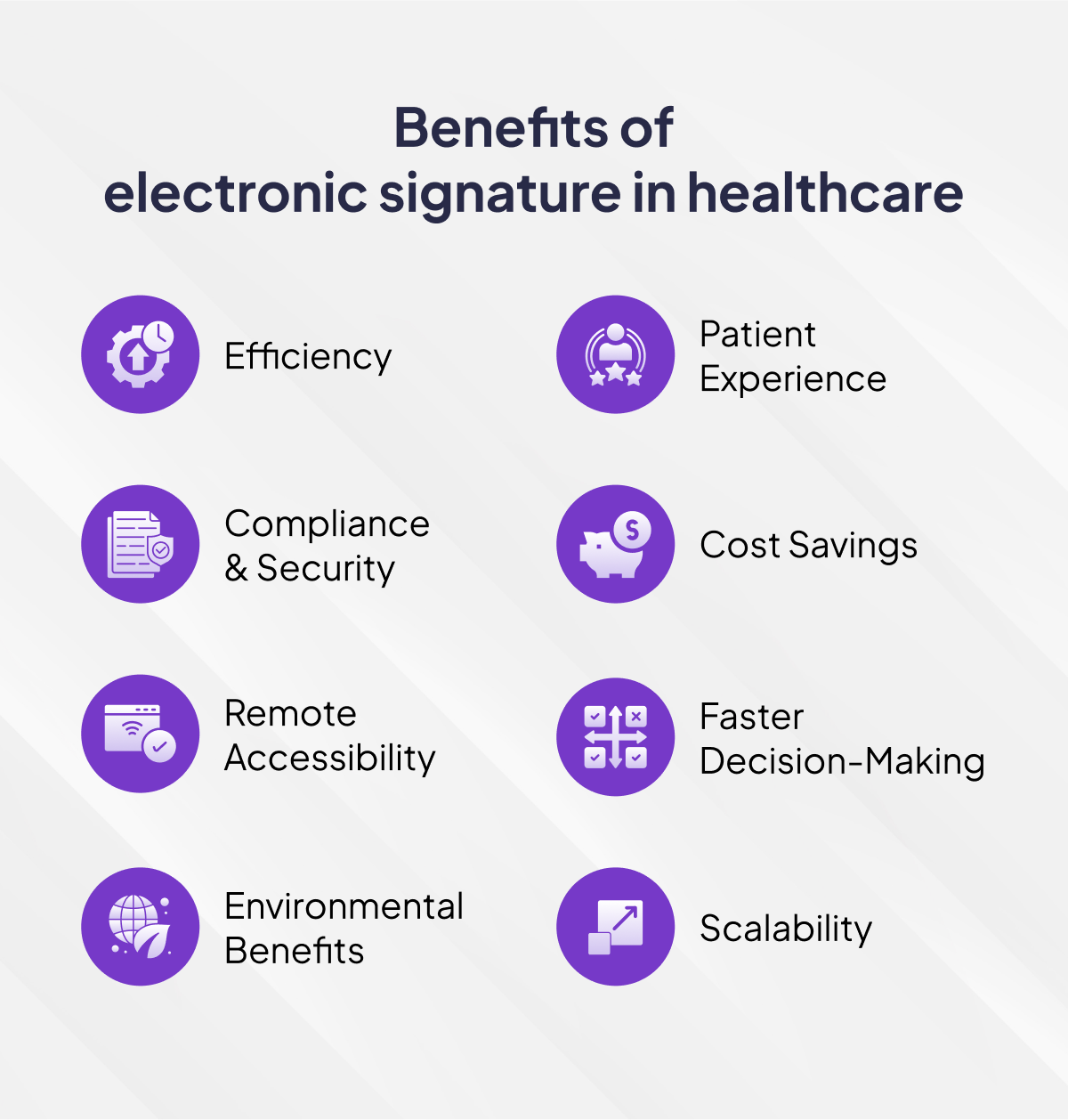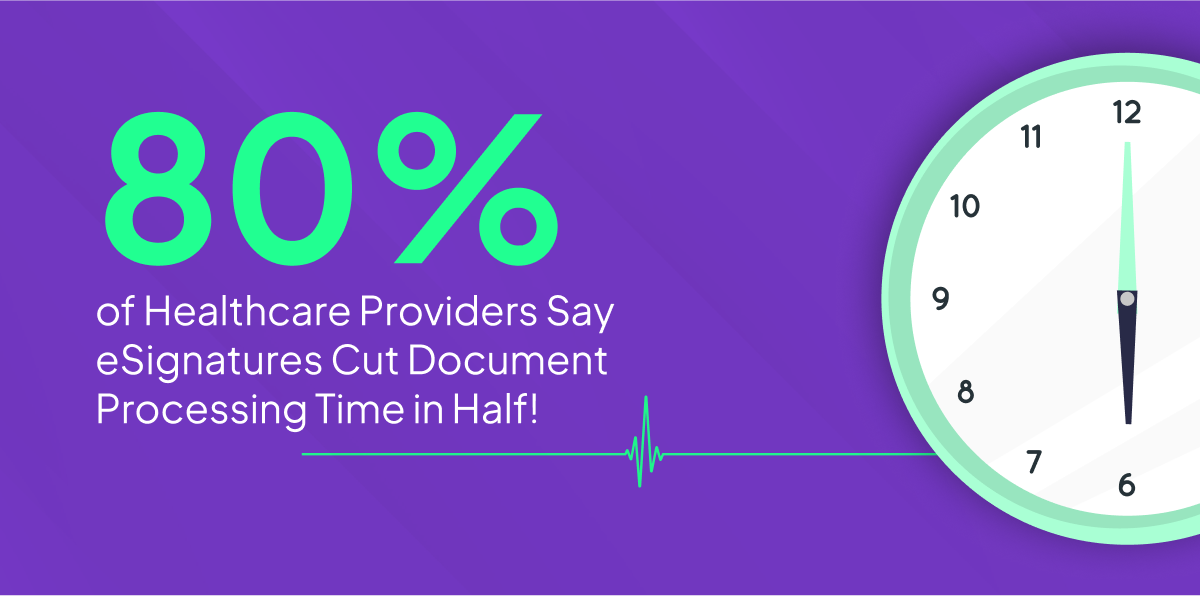Think about it. With just a few taps on a screen, you can sign consent forms, streamlining medical records with eSignatures, or even participate in groundbreaking clinical trials. It's not just about convenience though. Digital signatures are like invisible guardians, keeping your sensitive health info safe and sound. They're making sure everything's above board and following all those compliant healthcare rules.
Today’s evolving healthcare landscape is seeing an increase in the adoption of electronic signature software for healthcare. Especially for medical institutions in streamlining processes, enhancing patient care, and ensuring compliance with stringent regulations.
In this guide, we're going to break down everything you need to know about electronic signatures healthcare. Whether you're a doctor tired of paperwork, a hospital manager looking to cut costs, or just someone curious about how tech is changing medicine, you're in the right place.
Understanding Electronic Signatures Healthcare
What are Electronic Signatures?
Electronic signatures, or eSignatures, have revolutionized document management in healthcare, offering a secure and efficient alternative to traditional pen-and-paper signatures. These digital marks serve as legally binding endorsements on a wide array of medical documents, streamlining critical processes from patient intake to complex clinical trials. By eliminating the need for physical paperwork, eSignature for healthcare significantly reduces administrative burdens, minimize errors, and expedite workflows, allowing healthcare professionals to focus more on patient care.
The versatility of eSignatures in healthcare is remarkable, extending far beyond basic consent forms. They're utilized for approving medical bills, managing clinical trial documentation, signing off on test results, and even facilitating telemedicine consultations. This digital approach not only enhances efficiency but also bolsters security and compliance with stringent healthcare regulations like HIPAA.
Advanced eSignature solutions for healthcare offer features such as encryption, audit trails, and multi-factor authentication, ensuring the integrity and confidentiality of sensitive medical information. As healthcare continues its digital transformation, eSignatures stand at the forefront, paving the way for more agile, transparent, and patient-centered medical care.
Types of Electronic Signatures
There are three main types of electronic signatures:
- Simple Electronic Signature (SES): Basic digital marks like typed names or scanned signatures.
- Advanced Electronic Signature (AES): More secure, with unique identification and tamper-evident features.
- Qualified Electronic Signature (QES): The most secure, legally equivalent to handwritten signatures in many jurisdictions.
To know more about the types of electronic signature in detail, Check out this blog - QES vs. AES vs. SES: Understanding Electronic Signature Types
How ZoopSign Enhances eSignature Functionality?
ZoopSign, a leading eSignature solution, enhances functionality by offering features like Aadhaar eSign for secure identity verification, ensuring the highest level of authenticity and compliance.
Legal Framework and Compliance
The use of electronic signatures in healthcare is governed by several laws and regulations.
Industry Laws Governing eSignatures:
1. ESIGN Act and UETA
These U.S. laws provide the legal framework for the validity of electronic signatures across various industries, including healthcare.
2. HIPAA Compliance and eSignatures
The Health Insurance Portability and Accountability Act (HIPAA) sets standards for protecting sensitive patient data. Electronic signatures used in healthcare must comply with HIPAA regulations to ensure the confidentiality and integrity of patient information.
Are Electronic Signatures HIPAA Compliant?
Yes, electronic signatures can be HIPAA compliant eSignatures when implemented correctly. HIPAA allows for the use of electronic signatures provided that:
- The document being signed electronically complies with federal and state contract laws.
- Any Protected Health Information (PHI) in the document is protected from unauthorized access and impermissible disclosures.
ZoopSign for healthcare ensures industry compliance through its robust security features and encryption protocols, making it a good choice for healthcare institutions.
Benefits of Electronic Signatures in Healthcare
The adoption of eSignatures for healthcare brings numerous advantages. Here are a few ways of how hospitals use eSignatures:
1. Cost Reduction and Efficiency
Electronic signature software for healthcare significantly reduces administrative costs associated with paper-based processes. ZoopSign's streamlined workflow minimizes manual data entry, printing, and storage expenses.
2. Improved Patient Experience and Satisfaction
eSignatures for healthcare enable faster document processing, reducing wait times and improving overall patient satisfaction. ZoopSign's user-friendly interface allows patients to sign documents quickly and easily, even remotely.
3. Enhanced Security and Data Integrity
Digital signatures provide a higher level of security compared to traditional paper signatures. ZoopSign's advanced verification features ensure the authenticity and integrity of signed documents.
4. Streamlined Workflow and Document Management
Electronic signatures facilitate faster approvals and reduce document turnaround times. ZoopSign's Doc-Track feature allows healthcare providers to monitor document status in real-time, improving overall workflow efficiency.
Use Cases of eSignatures in Healthcare
Electronic signatures have a wide range of applications in the healthcare sector:
1. Patient Records Management
eSignatures streamline the process of updating and maintaining patient records. ZoopSign enables secure verification of patient consent forms eSignatures and other critical documents. Remote patient onboarding with eSignatures is possible too.
2. Clinical Trials and Research Documentation
In clinical research, eSignatures expedite the signing of trial agreements and consent forms. ZoopSign's platform ensures efficient management of these crucial documents.
3. Insurance Claims Processing
Cost saving with electronic signatures in healthcare speed up the processing of insurance claims. ZoopSign's quick signing feature for insurance paperwork reduces delays in claim settlements.
4. Telehealth Services and Consent Forms
With the rise of telehealth, eSignatures have become essential for obtaining remote patient consent. ZoopSign's WhatsApp eSign feature allows for seamless remote signing of consent forms.
Implementing eSignature Solutions for Healthcare
To implement eSignatures in healthcare:
- Choose an industry-compliant eSignature solution like ZoopSign for healthcare.
- Integrate the solution with existing electronic health record (EHR) systems.
- Train staff on using the new eSignature system.
- Gradually transition from paper-based to electronic signatures.
- Read Here - Advantages of Aadhaar eSign over Traditional Digital Signatures
ZoopSign offers a user-friendly platform that can be easily integrated into existing healthcare workflows.
Common Documents for Electronic Signatures in Healthcare
Healthcare institutions commonly use eSignatures for:
- Patient consent forms eSignatures
- Admission forms
- Digital Signatures for Medical Billing and invoices
- eSignature Compliance in Clinical Trials
- Physician orders
- Prescription forms
- Employee contracts
ZoopSign's versatile platform accommodates all these document types, offering features like PDF editing and secure sharing to enhance document management. eSignature and contract management in healthcare is equally important.
Challenges and Considerations
While eSignatures offer numerous benefits, healthcare institutions must address potential challenges:
1. Security Concerns
To mitigate security risks, ZoopSign employs advanced encryption and multi-factor authentication, ensuring the confidentiality of sensitive medical information.
2. Patient Education
Some patients may be unfamiliar with eSignatures. Healthcare providers should educate patients on the security and convenience of digital signing processes.
3. Regulatory Compliance
Staying compliant with evolving healthcare regulations can be challenging. ZoopSign regularly updates its platform to meet the latest compliance standards, including industry requirements.
Future Trends in Electronic Signatures for Healthcare
The future of eSignatures in healthcare looks promising:
- Increased integration with AI and machine learning for improved document processing and fraud detection.
- Blockchain technology for enhanced security and immutability of signed documents.
- Biometric authentication methods for more secure identity verification.
- Greater interoperability between different healthcare systems and eSignature platforms.
ZoopSign continues to innovate, incorporating advance technologies to stay ahead of these trends and provide state-of-the-art eSignature solutions for the healthcare industry.
Conclusion
Electronic signatures have become an indispensable tool in modern healthcare, offering improved efficiency, enhanced security, and improving Patient Experience with eSignatures. As the industry continues to digitize, the adoption of robust eSignature solutions for healthcare like ZoopSign will be crucial for healthcare institutions looking to streamline their operations and provide top-quality care.
By embracing electronic signatures, healthcare providers can reduce costs, improve compliance, and focus more on what truly matters – patient care. As we look to the future, the role of eSignatures in healthcare will only grow, paving the way for more efficient, secure, and patient-centric medical practices.
Ready to transform your healthcare documentation process?
Explore ZoopSign's innovative eSignature solutions for the healthcare industry.
Schedule a free demo today and discover how ZoopSign can revolutionize your document management, enhance security, and improve patient satisfaction.
Citations:
- Hashemi-Pour, C., Lutkevich, B., & Wallask, S. (2024, October 7). What is PHI (protected or personal health information)? Health IT and EHR. https://www.techtarget.com/searchhealthit/definition/personal-health-information
- Hashemi-Pour, C., Lutkevich, B., & Wallask, S. (2024, October 7). What is PHI (protected or personal health information)? Health IT and EHR. https://www.techtarget.com/searchhealthit/definition/personal-health-information

